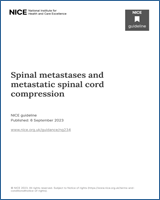Excerpt
It is difficult to know what the true incidence of metastatic spinal cord compression (MSCC) is in England and Wales because the cases are not systematically recorded. However, evidence from an audit carried out in Scotland between 1997 and 1999 and from a published study from Ontario, Canada, suggests that the incidence may be up to 80 cases per million population per year. This would mean around 4000 cases per year in England and Wales or more than 100 cases per cancer network per year.
The Clinical Resource and Audit Group (CRAG) audit clearly showed that there were significant delays from the time when patients first developed symptoms until hospital doctors and general practitioners recognised the possibility of spinal cord compression and made the appropriate referral. The median times from the onset of back pain and nerve root pain to referral were 3 months and 9 weeks respectively. As a result, 48% of patients were unable to walk at
the time of diagnosis and of these the majority (67%) had recovered no function at 1 month. Of those walking unaided at the time of diagnosis (34%), 81% were able to walk (either alone or with aid) at 1 month. The ability to walk at diagnosis was also significantly related to overall survival.
At present, relatively few patients with malignant spinal cord compression in the UK receive surgery for the condition. But research evidence suggests that early surgery may be more effective than radiotherapy in a selected subset of patients.
While every effort has been made to ensure the accuracy of the information contained within this publication, the publisher can give no guarantee for information about drug dosage and application thereof contained in this book. In every individual case the respective user must check current indications and accuracy by consulting other pharmaceutical literature and following the guidelines laid down by the manufacturers of specific products and the relevant authorities in the country in which they are practising.


